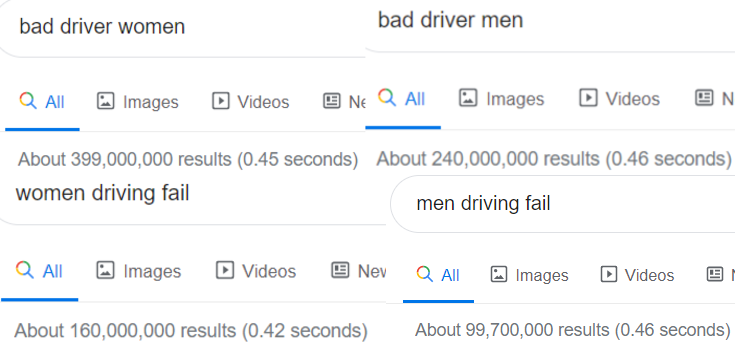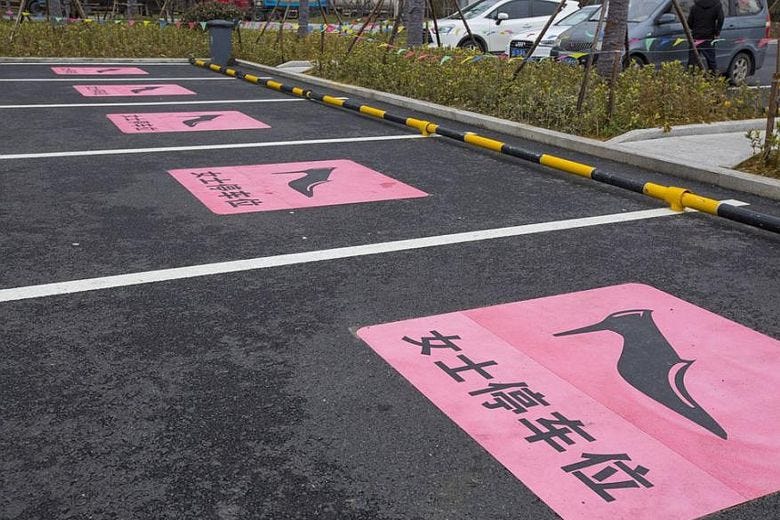Being female in China
I have recently been given a car from my dad to drive around. It is a car 10 years old and it has done 150k miles/240k kilometers but still in surprisingly good condition thanks to my dad having done good maintenance on it.
But as I drive around, I can’t help but notice how other cars on the road react to me. I felt like I was being bullied while I drive, cars would cut me without warning, beep me for seemingly no reason, all while I have been driving perfectly in my lane, following the speed limits and using my indicators properly. I have my full license already so I do not have the ‘probationary period’ badge on my car. All of these can be explained by the simple fact that I am in China, a country not exactly known for having good drivers, the reasons of which this article tries to identify (Note: it has nothing to do with race or culture).
Or it could be I am a female driver.
Female drivers are usually seen as worse drivers, globally. A simple search on Google confirms this bias (Google is blocked in China so I am using an anti-censorship software to bypass the block). At least 60% more results show up when the gender is swapped in the search term.

Sexism against females are rampant in China. In the case of female drivers, the sexism is displayed in plain daylight. Beijing Police (capital of China) once published a post titled “Female drivers, please pay attention and avoid driving mistakes” which the BBC reported on.
“Some female drivers lack a sense of direction and are often hesitant as to which roads to take.”
“This is particularly so when [they] drive on roads such as elevated bridges. They often can’t find the entrance or the exit. They can’t remember how to find places which they have been to several times.”
The post has been criticized as sexist, but this is far from the only display of sexism towards female drivers in China. The Straight Times (newspaper based in Singapore) reported on ‘female only parking spaces’ marked with stiletto on pink background and happens to be larger than other parking spaces because ‘haha female drivers bad’. Many Chinese social media users also railed against female drivers after bus plunges into the river, which was caused by a collision with a car, driven by a woman. SCMP (newspaper based in Hong Kong) reported on the sexism that surfaced after this incident, including comments on Chinese social media such as ‘The traffic management authorities should just ban women from driving’.


In Shenzhen, ‘Priority carriages for women’ is available on all lines of subway. It claims to help women avoid being harassed by males on the subway, but this is not a solution for sexual harassment and instead a move that can potentially turn into victim blaming because ‘you should have stayed in your carriages or expect to be harassed’, similar to how people blame rape victims for wearing the clothes they wore at the time instead of the person actually at fault, the rapist.
Job advertisements frequently displays sexism according to a SCMP article, ‘Looking for a pretty female, must be taller than 1.70 meters, with fine features’, these type of job advertisements are considered illegal according to Chinese law but the authorities are not bothered to actually enforce it. In some areas of the country, women are not even allowed to eat on the main dining table, not to mention the countless girls that are not even allowed to ever live, because the parents chose to abort them as soon as they found out they will be having a daughter instead of a son. The practice of finding out the sex of the baby before birth is strictly prohibited by law in order to prevent sex-selective abortions, but just as in job advertisements, this is often unenforced. This practice of female infanticide is exposed by documentary films such as It’s a Girl: The Three Deadliest Words in the World.
As I was growing up, I constantly heard remarks like ‘Girls perform better than boys before the third grade (in primary school) only, they lack the energy to keep them going far’, and as I aged that magical time when girls will suddenly not have the energy to keep going gets replaced for no apparent reason, once it was ‘after primary school’, then it became ‘after middle school’, and then ‘in high school’, ‘in college’, ‘in jobs’…
I went a couple weeks ago to a computer repair store to fix my MacBook, I heard the remark of ‘Girls are better than boys nowadays, many boys won’t even be able to dismantle this computer to find out where the problem is and girls like you can do it’, as I explained to the shop technician what I thought the problem was. His words recognized my worth, but that is still troublesome because my worth was recognized based on being myself, but established by my comparison to the benchmark, a man.
I wish for a day that I would no longer hear those words.
I wish for a day when my first action when I get into the car is not locking the door immediately before even putting down my bag, for my own safety, something my mom taught me and something my dad never had to worry about.
I wish for a day when menstruation is not a taboo topic.
I wish for a day when people are no longer discriminated or stereotyped against because of their gender.
I wish for a day when I can say I am female without others perceiving me as a less-than-whole person in this country.
But until that day comes, many Chinese women’s wish list includes ‘not being born female’, which is something I have even heard from the person who gave me birth.
P.S. I started writing this after being sick of sexism I see and experience in China as female, and the last straw was Zhihu (Chinese equivalent of Quora, which is blocked) sent me a notification, recommending me to read a sexist answer to the question ‘Why do people say women are bad drivers’, answers to which is basically entirely sexist, one-sided and extremely biased view. I know this an incomplete experience of being female in China, or experienced by Chinese women, I can only write so much at this point in time and I only have what I know and have experienced as reference, but I might come back to this topic in the future.
